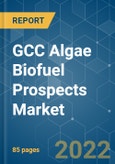The GCC algae biofuel prospects market is expected to rise at a CAGR of more than 1% during the forecast period of 2020-2025. Factors such as concerns about peak oil, energy security, fuel diversity, and sustainability, and there is considerable interest around the GCC in renewable sources of biofuels, are likely to drive the algae biofuel market. However, the cost of providing energy through algae biofuel is much higher than fossil fuels, which may act as a restraint on the market.
Key Highlights
- Oil is the most used fossil fuel in the region, with all the countries in the Gulf Cooperation Council producing it. However, sustainability and energy security concerns of the environment and maturing of oil fields may provide algae biofuels as a feasible alternative.
- In 2019, a team of chemical engineers had developed a new jet mixer technology that precludes the need for energy-intensive drying processes. The new mixing reactor shoots jets of solvent into jets of algae in liquid suspension, creating the turbulence needed to prompt the lipids to transfer into the solvent stream. Further research in the arena for large scale usage is being developed and may provide an opportunity for the market players.
- Qatar is expected to be the largest market for the algae biofuel market as it has been investing in the research and development of biofuel in collaboration with different organizations, which may lead to extensive scale cultivation and production of algae biofuel.
Key Market Trends
Fuel Diversification to Drive the Market
- Although the region has vast reserves of oil and gas, depending on one source for energy may become a cause of concern, if any crisis such as oil prices below the cost of production or maturing of fields may hit the industry. Therefore, the diversification of fuel for energy security and sustainability becomes the optimal choice and is expected to drive the algae biofuel market.
- Microalgae are great candidates for the sustainable production of biofuels and associated bioproducts due to the natural forming oils that have good biodiesel potential. Algae also produce other lipids that have the potential for aviation fuel, and microalgal biomass itself can be converted to or used directly as fuel, and high biomass cultivation of microalgae could mitigate carbon dioxide and other greenhouse gases as the microalgae photosynthesize and grow. These qualities make the algae biofuel a great alternative to fossil fuels.
- Oman has a great potential to provide algae for the synthesis of biofuel. With its lakes and seas, the country is an excellent source of algae that can be cultivated for lipids or fats from which biofuel can then be derived. Oman has large scale algae formation in the country, with even the color of water turning red due to their presence. The government is looking for ways to turn them into useful biofuels to be used in transportation and power generation.
- The region consumed around 506.3 million tonnes of oil equivalent, in 2018, which is approximately 0.12% higher than in 2017. The region requires a high amount of energy, which is significantly provided by the use of oil. Due to concerns of global warming and fuel diversification, more sustainable and efficient mechanisms of production of energy are required to be discovered. Algae biofuel may provide that alternative to the fossil fuel industry.
- Hence, the prospect of algae biofuel in the region is quite favorable as the region already contains the algae sources, a feasible proposition in the algae biofuel production may quickly change the energy mix landscape in the region.
Qatar to Dominate the Market
- Qatar is a significant oil and gas producer in the world with producing 1879 thousand barrels of oil per day in 2018. However, the country is investing in the algae biofuels industry as it may provide for as a better alternative for fossil fuels in the future.
- As algae biofuel is, in 2020, not economically viable, studies are being conducted in the country to find a natural source of algae, making algae production commercially sustainable and conversion of the algae to biofuel with low unused by-products.
- In 2019, Total and Qatar University's Center for Sustainable Development initiated two research projects to investigate microalgae from Qatar to produce biofuels. Algae are sustainable sources of biomass, which can be used for a multitude of applications, including biofuels production and CO2 sequestration using non-arable lands. The research project is trying to reduce the production cost and increase the utilization of algae biofuel, thereby aiding the growth of the market.
- Qatar is the largest user of biomass for electricity generation in the region. Techniques used for biomass may be used for the algae-based biofuel processes. In 2018, the country had a biomass installed capacity of 38 Megawatt. The installed capacity is likely to increase in the forecast period as the technology becomes more viable.
- Hence, the prospect of algae biofuel, in Qatar, largely depends upon the creation of an economically sustainable supply chain. Moreover, the government's focus on research and development of algae biofuels is expected to yield positive results for the market.
Competitive Landscape
The GCC algae biofuel prospects market is consolidated. Some of the key players in this market include Total SA, Royal Dutch Shell PLC, Chevron Corporation, Exxon Mobil Corporation, Qeshm Microalgae Biorefinery Co.
Additional Benefits:
- The market estimate (ME) sheet in Excel format
- 3 months of analyst support
This product will be delivered within 2 business days.
Table of Contents
Methodology

LOADING...








